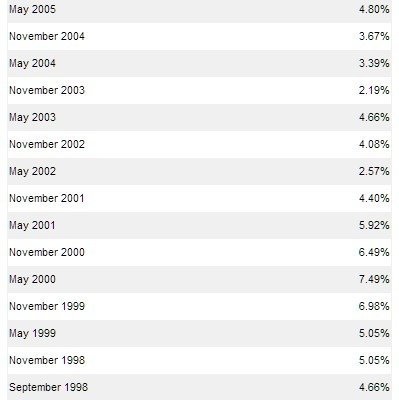You give these spotty disclosures that are very hard to put together. I quit trying some time ago so I may have missed some things, but it seems that you live quite well (2 homes), pay little or no income tax, are not interested in investing (and have at times implied that you have no investment portfolio), Additionally you are getting on, and have both been retired for many years.
Where does the money come from? 1, 2, or more pensions? Good social security? An investment portfolio that you just call by some other name?
Because it is just not cheap to keep two homes, or to live many years with no or little earned income.
Ha
Yeah... sometimes it confuses me, too.
First, the taxes... IBonds are not taxable for the first 30 years, nor is the small annuity. This represents a major portion of our limited capital assets, which to date have not been taxed. This will change eventually. We have been taking from our IRAs, but up until now, still under or below the taxable limit. I guess you could call the bonds and annuity a portfolio, but as they just sit there, I don't think of it that way. Either way, we have taken nothing from these assets.
In the earliest years after we retired in 1989, and before collecting SS @ age 62, we lived from our savings which were invested in CD's, which were paying as much as 8% at the time. Whatever assets we had, came from the sale of my small business, and monies from the sale of the different houses that we owned as we moved 22 times since 1958. Our cost of living at retirement was low, as we were living in our campground, in Illinois, and in a small mfg home in Florida. Throughout those early years of retirement, no earned income, so no taxes. Toughest part was healthcare... less than today, but still $9K to $11K for the two of us.
We took SS @ age 62, and current amt. for both of us totals $25K/yr. We bought our home in the IL CCRC in 2004, to assure ourselves that in the event nursing home expenses ate up our savings, the home would be exempt from the state (payiing for medicaid)... and available for the surviving partner.
Now, as to the 2 homes... sounds a lot more expensive than it is... (Actually 3 homes... Liberty Village inPeru, our home in Florida, and our Campground complex. Curent annual expenses for the two latter places totals about $10K/yr. These two places will be sold within the next few years, freeing up that expense, and puting the value back into our asset base.
Next... our phase II plan kicks in, at age 80... Worst case scenario, we sell our home here and move to the Apartments in Liberty Village. So the
austerity math at age 80... to live until age 90.
Total 10 years phase II
.................................
$30K for two in the apartments (all expenses: food, utilities, transportation etc included)
$12K medical.
total
base expenses. $42K yr.
paid for by:
sale of house $180K est. or $18K/yr
SS @ $25K
total
base planned payout. $43K/yr..
This would leave our nest egg... intact.
Yeah, for sure... inflation, changes in the economy, and a million factors that aren't in there, but all in all, for better or worse, that's the plan. Always easier to look ahead, when figuring in a finite horizon.
Edited to add...

Sure you can retire on 100% Treasuries......IF your nest egg is massive enough
Massive... yeah... right... Not quite... even Not Not Quite.
I just can't buy into the thinking that one has to live off the income from ones assets, and leave the nest egg intact for the kids, the church or the SPCA. When we get close... we'll take what's left, and go on a world wide tour, or move into the Four Seasons for the final days.



